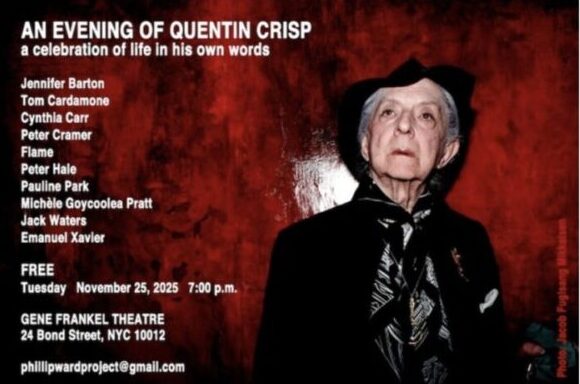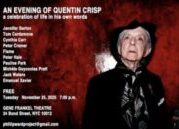
Quentin Crisp was a flamboyant and eccentric queer raconteur: a great wit who was also a controversial gay icon. His life story sounds somewhat like a Jean Genet novel: a rent boy who spent some 20 years undressed as artists model, who spent WWII dressed very effeminately and cruised the streets of London looking to pick up American GI’s. Her memoir The Naked Civil Servant was published in 1968 to good reviews but to poor sales but one person who did buy the book was documentary filmmaker Denis Mitchell who asked Crisp if could adapt into a film. The result made the actor John Hurt and Crisp into stars
On the back of this newfound fame Crisp devised a one-person show which she toured all over the UK. The first half of the show was an entertaining monologue loosely based on her memoirs, while the second half was a question-and-answer session with Crisp picking the audience’s written questions at random and answering them in an amusing manner. Her witticisms became much quoted: There is no need to do any housework at all. After the first four years the dirt doesn’t get any worse.
The show was a sell-out in London, so Crisp took it to NY and very quickly became the toast of the city, where she said she officially considered herself transgender. She decided to move there permanently and found a tiny apartment in the East Village and quickly blossomed in this new found fame and celebrity which combined with performing the show, and she could live off both of them. With small roles in films like Orlando and To Wong Foo, Thanks for Everything! Julie Newmar the 1990’s became a very busy period for Crisp. However it was also a time when the eccentric Crisp started trottng out certain opinions which verged on being both offensive and downright homophobic. Even though she had an uncredited cameo in the 1993 AIDS drama Philadelphia, Crisp still caused controversy and confusion in the gay community by calling AIDS “a fad”, and homosexuality “a terrible disease.” That did not sit well as so many of us were dealing with both the personal and global costs of the Pandemic
Crisp’s comments on Princess Diana were nothing short of viscious. She stated: “I always thought Diana was such trash and got what she deserved. She was Lady Diana before she was Princess Diana, so she knew the racket. She knew that royal marriages have nothing to do with love. You marry a man and you stand beside him on public occasions and you wave and for that you never have a financial worry until the day you die. Following her death in 1997, she commented that it was perhaps her “fast and shallow” lifestyle that led to her demise: She could have been Queen of England – and she was swanning about Paris with Arabs. What disgraceful behaviour! Going about saying she wanted to be the queen of hearts. The vulgarity of it is so overpowering.”
Thanks to Crisp’s Executor and former Personal Assistant Philip Ward, there are still readings of his work some 26 years later after his death. Such as the upcoming “An Evening of Quentin Crisp: A Celebration of Life in His Own Words” invites you to a night of celebration at the Gene Frankel Theatre to commemorate the legendary life of Quentin Crisp on the 26th anniversary of his passing. Special guests will read excerpts from Mr. Crisp’s books, two short films by filmmaker Adrian Goycoolea (Mr. Crisp’s great-nephew), Phillip Ward, and a rare screening of the Alternative Queen’s Message. His work is too good to be forgotten, even if some of his worst opinions cannot.


Comments
One response to “An Evening sharing the work of Quentin Crisp (except for his pernicious homophobia )”
Thank you for this posting and alerting the public to the upcoming event at the Gene Frankel Theater on the 25th of this month at 7:00 p.m.
Regarding Quentin’s remarks about AIDS:
Quentin was not an AIDS denier, definitely not.
Thanks to continued references in print media and the movie AN ENGLISHMAN IN NEW YORK, Quentin’s remark that AIDS was/is a fad continues to be perpetuated over and over again, AND without explanation as to his perceived flippant and careless remark that “AIDS is a fad.” However, as was his practice, Quentin never withdrew nor apologized for his remark.
Quentin moved to New York City in 1981 at age 72, and within a short time, he began writing for various LGBTQ newspapers and magazines. He never read newspapers or magazines to obtain daily news. However, he did watch television for news reports and listened to and parroted whatever was said to him and spoken about around him. Quentin engaged LGBTQ editors and writers who reported on the latest news regarding HIV/AIDS at the time. They were his primary news source, and Quentin repeated that information in his writings and performances.
In 1982, HIV/AIDS was essentially in its infant stage, and information about the disease was virtually unknown or little known. And it was during this time that Quentin began writing for CHRISTOPHER STREET magazine and NEW YORK NATIVE. Surrounding Quentin were notable editors and writers within the editorial community, and whatever they discussed around Quentin, he parroted all that they said and all that he heard. He believed and repeated what the editorial pundits were saying.
In this environment, many of the gay men surrounding Quentin were sexually active and contracted STDs regularly. These men visited their doctors for treatment without any significant concern. They would receive antibiotics, and all would be fine, or so it seemed. Their behavior and nonchalant attitude appeared to Quentin as faddish conduct, and it was because they knew that treatment would wash the STDs away without any worries–until HIV/AIDS arrived. Conspiracies began, and Quentin’s remarks became unapologetically visible. In other words, Quentin repeated what he heard. He may have voiced his opinion, but it was also the opinion of the gay community that surrounded Quentin—the gay writers of the print media that he engaged regularly.
Over the years, Quentin actively and generously donated money to various LGBTQ organizations, particularly those focused on HIV/AIDS and the American Foundation for AIDS Research (amfAR). He participated in and donated his time to various events related to HIV/AIDS until his passing in 1999. So, to say that Quentin was an AIDS denier is absurd and incorrect.
Phillip Ward
Quentin Crisp’s literary/estate executor and editor